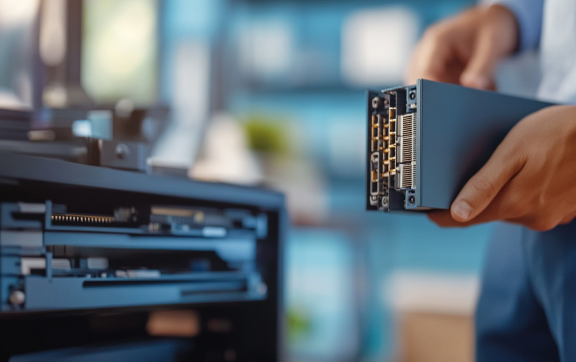In today's fast-paced business environment, having a reliable, scalable, and accessible point of sale (POS)…

Expand Your Storage Capacity with Reliable Disk Enclosures
In the ever-evolving landscape of digital data, businesses and individuals alike face the growing need for increased storage capacity. As data continues to accumulate, finding efficient and reliable solutions to expand storage becomes crucial. Disk enclosures offer a versatile and effective way to boost your storage capabilities. At IT Portal, we provide high-quality disk enclosures designed to meet your specific storage needs, ensuring data safety, scalability, and ease of use.
Understanding Disk Enclosures
Disk enclosures are external casings that house hard drives or solid-state drives (SSDs), allowing them to be connected to a computer or network as external storage. These enclosures provide a protective environment for the drives while enabling easy access to additional storage. They come in various sizes and configurations, accommodating different types of drives and connection interfaces.
Benefits of Disk Enclosures
1. Increased Storage Capacity
One of the primary benefits of disk enclosures is their ability to significantly increase your storage capacity. Whether you’re a business dealing with large volumes of data or an individual with extensive multimedia files, disk enclosures offer a flexible solution. You can easily add multiple drives to an enclosure, providing ample space for your growing data needs.
2. Flexibility and Scalability
Disk enclosures provide exceptional flexibility and scalability. As your storage requirements grow, you can add more drives to your existing enclosures or purchase additional enclosures. This modular approach allows you to scale your storage capacity incrementally, avoiding the need for large upfront investments in new storage systems.
3. Enhanced Data Security
With disk enclosures, you can implement various data security measures to protect your information. Many enclosures support RAID (Redundant Array of Independent Disks) configurations, which offer data redundancy and improved fault tolerance. This ensures that your data remains safe even if one of the drives fails. Additionally, some enclosures come with built-in encryption features to further secure your data.
4. Portability and Convenience
Disk enclosures make your storage portable and convenient. You can easily transport your data between different locations by simply disconnecting the enclosure and reconnecting it to another computer or network. This is particularly useful for businesses that need to share large files or individuals who require access to their data on multiple devices.
5. Cost-Effectiveness
Expanding your storage capacity with disk enclosures is a cost-effective solution compared to investing in entirely new storage systems. You can reuse existing drives and upgrade your storage incrementally as needed, making it a budget-friendly option for both businesses and individuals. Additionally, the ease of installation and minimal maintenance reduce overall operational costs.
Choosing the Right Disk Enclosure
When selecting a disk enclosure, consider factors such as the type of drives you plan to use, the required storage capacity, and the connection interfaces. At IT Portal, we offer a wide range of disk enclosures to suit different needs. Here are some key considerations:
1. Drive Compatibility
Ensure that the disk enclosure is compatible with the type of drives you intend to use, whether they are HDDs or SSDs. Some enclosures are designed specifically for 2.5-inch or 3.5-inch drives, while others can accommodate both sizes.
2. Connection Interfaces
Choose an enclosure with the appropriate connection interfaces for your setup. Common options include USB, eSATA, Thunderbolt, and Ethernet. Consider the data transfer speed and compatibility with your existing hardware.
3. RAID Support
If data redundancy and fault tolerance are important to you, look for enclosures that support RAID configurations. Different RAID levels offer varying degrees of data protection and performance enhancements.
4. Cooling and Ventilation
Proper cooling and ventilation are essential to maintain the longevity and performance of your drives. Opt for enclosures with built-in cooling systems or adequate ventilation to prevent overheating.
Implementing Disk Enclosures
Implementing disk enclosures is straightforward and can be done with minimal technical expertise. Follow these basic steps:
- Choose Your Enclosure: Select the disk enclosure that meets your requirements based on drive compatibility, connection interfaces, and additional features.
- Install the Drives: Insert your hard drives or SSDs into the enclosure according to the manufacturer’s instructions. Ensure they are securely connected.
- Connect to Your System: Connect the disk enclosure to your computer or network using the appropriate cables. Make sure the connection is stable and secure.
- Configure and Format: If necessary, configure RAID settings and format the drives for initial use. This can usually be done through your operating system’s disk management tools.
- Monitor and Maintain: Regularly monitor the health and performance of your drives. Keep the enclosure clean and ensure proper cooling to maintain optimal functionality.
Conclusion
Expanding your storage capacity with reliable disk enclosures is a practical and efficient solution for managing growing data needs. Whether you’re a business requiring scalable storage or an individual seeking additional space for your files, disk enclosures offer the flexibility, security, and cost-effectiveness you need. At IT Portal, we are committed to providing top-notch disk enclosures that enhance your storage infrastructure. Contact us today to learn more about our products and how they can benefit your storage requirements.



